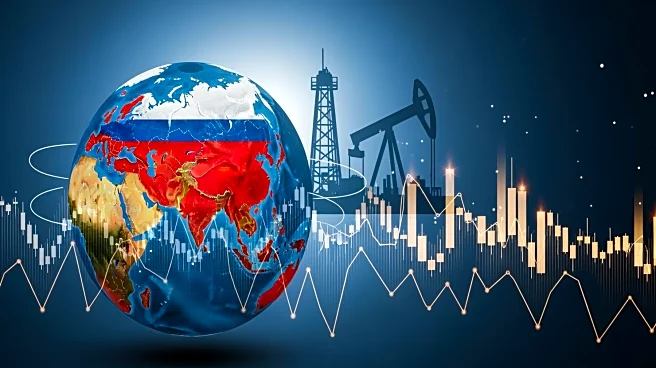What's Happening?
Asian markets experienced a downturn following President Trump's announcement of sanctions against major Russian oil companies, Rosneft and Lukoil. The sanctions are part of a strategy to pressure Russian President Vladimir
Putin into negotiations to end the conflict in Ukraine. As a result, crude oil prices surged, with U.S. benchmark crude rising by $2.31 to $60.81 per barrel and Brent crude increasing by $2.38 to $64.97 per barrel. The sanctions coincide with a European Union summit aimed at imposing further sanctions on Russia and utilizing frozen Russian assets to support Ukraine's economy. In Asia, stock markets reacted negatively, with Japan's Nikkei 225 dropping nearly 1.3% and South Korea's Kospi falling 0.9%. Meanwhile, Chinese shares also declined amid potential U.S. export restrictions.
Why It's Important?
The sanctions on Russian oil giants by President Trump have significant implications for global energy markets and geopolitical dynamics. The increase in crude oil prices could impact various sectors, including transportation and manufacturing, potentially leading to higher costs for consumers and businesses. The sanctions also underscore the ongoing geopolitical tensions between the U.S. and Russia, with potential repercussions for international relations and trade. Additionally, the EU's efforts to support Ukraine financially highlight the broader international commitment to countering Russian aggression, which could influence future diplomatic and economic policies.
What's Next?
The immediate future may see further volatility in global markets as stakeholders react to the sanctions and their implications. The European Union's continued efforts to impose sanctions and utilize Russian assets for Ukraine's benefit could lead to further economic and political responses from Russia. Additionally, the potential tightening of U.S. export restrictions to China may affect trade relations and economic strategies in the Asia-Pacific region. Investors and policymakers will likely monitor these developments closely to assess their impact on global economic stability and international relations.










